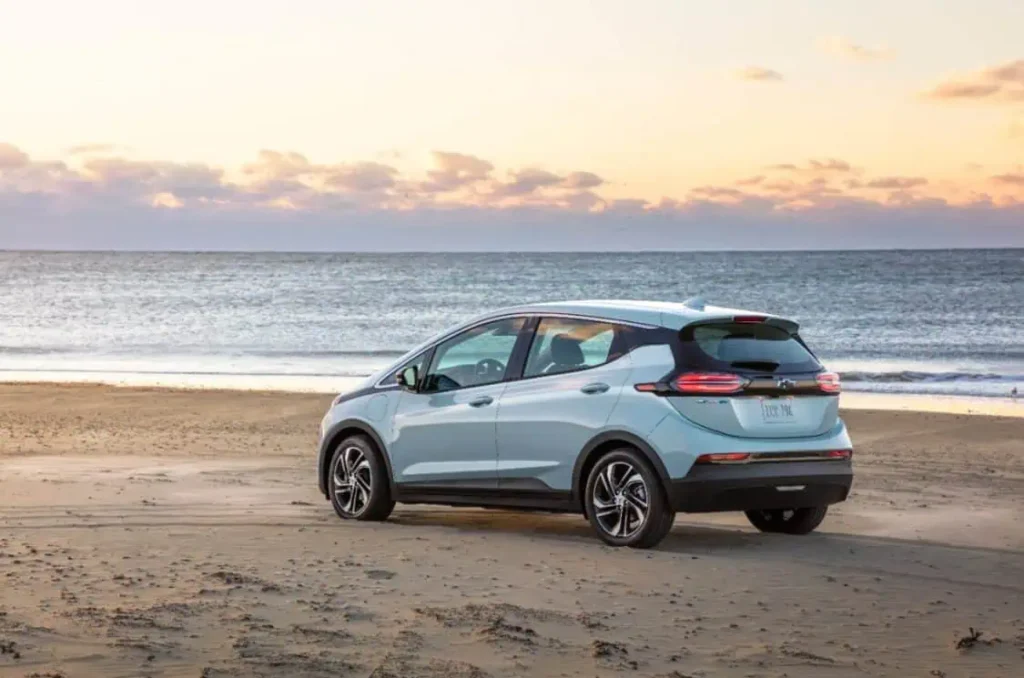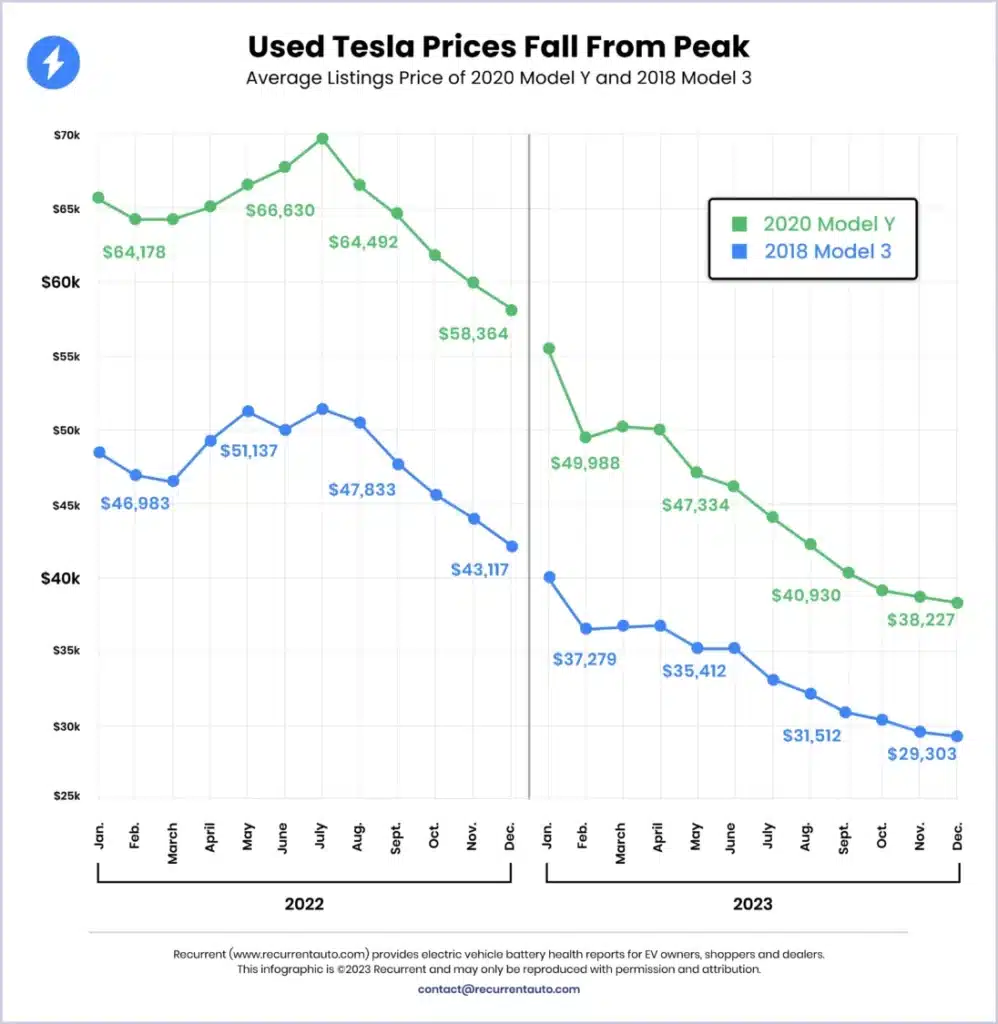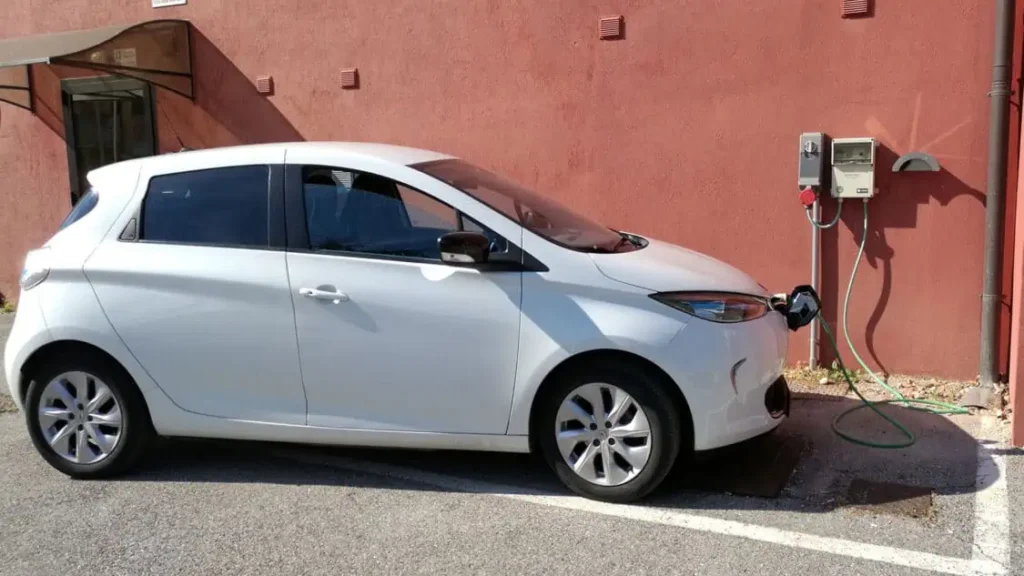Recurrent Expanding its Offerings in Fast-Growing Used EV Market
On January 8, 2024, Recurrent, the leader in used EV analytics, closed a $16-million Series A investment to add transparency for EV batteries and car values in the used EV market. Recurrent’s funding round was led by ArcTern Ventures, with added investment from Automotive Ventures, Goodyear Ventures, Wireframe Ventures, Pioneer Square Labs, and more.
Recurrent reports answer common questions for used EV shoppers. The company’s reports examine an EV’s history data and range data, comparing the data to thousands of other EVs in Recurrent’s database. The reports use the original range for a used electric vehicle’s make, model, and battery pack configuration to compute a range score, showing the used EV’s current maximum range. Both electric car dealers and used EV buyers use the highly valuable and helpful reports.

The Used EV Market Will Nearly Double
Recurrent provided valuable statistics for the current used EV market in the United States in the Used Electric Car Prices & Market Report — Q1 2024. The company’s report said that 2024 used EV sales volume will increase by roughly 100% over 2022’s volume and 40% over 2023’s volume. The report included the fact that car dealerships have been slow to register for point-of-sale federal EV tax credit rebates, with only 7% reported as of the first week of January 2024.
According to new data, Recurrent predicted that by late 2024, a used electric vehicle (EV) will be sold every minute in the U.S. One primary reason for this meteoric increase is the 2024 $4,000 point-of-sale federal tax credit for used EVs, compared to the year-end tax credits in 2023. Another important reason is that more used long-range models are now available.
“Our market indicators suggest that we are at the start of an inflection point for used electric cars in the U.S.,” said Scott Case, CEO of Recurrent. “Shoppers no longer need to choose between range and affordability.”
Used EV Prices Falling Dramatically
A recent study by iSeeCars.com revealed that used EV market prices are down 33.7 percent, while the average used internal combustion engine (ICE) vehicle price is down 5.1 percent, giving used EV shoppers an incredible opportunity. Used Hybrid prices are down 9.6%.

Most Popular Used EVs
In 2024, these used EVs generally offer a low price of under $15,000, which is generally half of the upfront cost or less of a new EV:
- Nissan LEAF
- Ford Focus
- Volkswagen e-Golf
- Kia Soul EV
- BMW i3
New or Used?

As the EV revolution is still young, typical new EV prices remain high. This has created a large segment of buyers considering used EVs rather than new EVs. Due to strict requirements, the 2024 federal tax credit is only available for a small number of new EVs. This has also steered many buyers toward used, who had been previously considering new EVs.
NYSERDA Provides Advice For Buying a Used Electric Vehicle
The New York State Energy Research and Development Authority (NYSERDA) provides a guide for used EV shopping. The first consideration in choosing a used EV is a gas-electric hybrid or a battery-electric vehicle (BEV), which runs only on electricity. EVs require less maintenance than internal combustion engine (ICE) vehicles, making them a superior choice. With either option, evaluating the vehicle’s condition, including the mileage, is essential. Get details on past inspections, maintenance, and accidents through reports such as Recurrent’s. EV battery range typically degrades by 2% annually.
Some electric automakers offer battery warranties lasting ten or more years. EV manufacturers are required to provide battery warranty coverage for at least eight years or 100,000 miles after the initial purchase of the EV. Most battery warranties are transferable to new owners.
Charging is an important consideration. If you are a homeowner, check that your home’s electric panel can handle a level 2 charger. If not, you may need to do an expensive upgrade. L2 chargers typically operate at 208-240 V and output anywhere from 3 kW to 19 kW of AC power. This power output provides from 18-28 miles of range per hour. All EVs come with Level 1 chargers, able to be plugged into any standard 120-volt (120V) AC outlet. Level 1 equipment can take 40 to 50 hours to charge an EV fully. Level 1 is an option for vehicles used less frequently.
If you cannot charge at home, investigate public charging options in your area. Public direct-current fast chargers (DCFCs) can charge an EV to 80% in as few as 20 minutes for longer trips. Your EV may need an adapter for charging. There are two main charging connector types: NACS and CCS.
Before purchasing a used EV, check to see that the seller included the correct charging cord. This and adapters or other vehicle-specific charging equipment can be expensive. If the seller did not include these, make sure that’s noted on the paperwork and reflected in the price of the vehicle.
2024 Is the Absolute Best Time to Buy a Used EV
Because of everything mentioned above, 2024 is shaping up to be the best year on record for the used EV market. With incredibly low prices and the addition of the point-of-sale federal tax credit up to $4k, great bargains exist. Recurrent offers valuable reporting on used electric vehicles in this expanding EV market. If you are considering buying a used EV, do your research and be sure charging will be seamless. Investigating the used EV’s history and range is an essential step in the buying process. Now, more than ever, more different used EV models, and a greater inventory are available for purchase. It is a perfect time to begin saving money through lower fuel costs, less maintenance, and fighting climate change with a used zero-emission vehicle.

Electric Vehicle Marketing Consultant, Writer and Editor. Publisher EVinfo.net.
Services